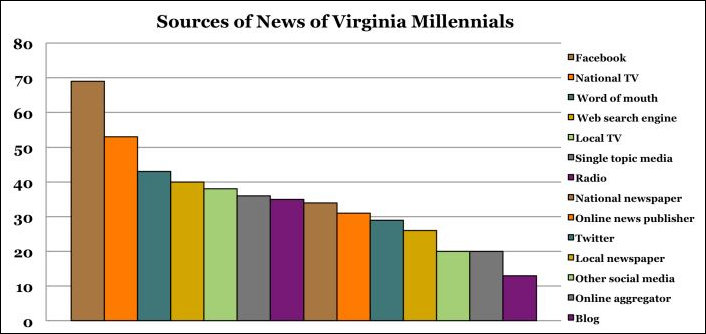by James A. Bacon
BH Media, a 71-paper newspaper chain, has expanded its reach in Virginia by purchasing the Fredericksburg Free Lance-Star. The acquisition expands the number of print-internet media properties in Virginia from 32 to 33.
The company, owned by Warren Buffet’s Berkshire Hathaway, established a presence in Virginia when it acquired Media General’s newspaper portfolio, including the flagship Richmond Times-Dispatch as well as newspapers in Charlottesville, Lynchburg, Danville, Bristol and a slew of smaller communities. Since then, among more notable acquisitions, the company has picked up the Roanoke Times, the Martinsville Bulletin and now the Free Lance-Star.
The acquisitions are a sign of weakness, not strength, in the newspaper business. By the economic logic of the pre-Internet world, The Free Lance-Star should be prospering — it owns the market in the fastest-growing metropolitan region of Virginia. But digital media have eviscerated newspaper revenues everywhere. The family-owned company filed for bankruptcy in 2014 and was purchased by the New York investment firm that re-sold it last week to BH Media.
Newspapers serve a shrinking audience — mostly an older demographic that never made the switch from print to digital. And its advertising base has been hollowed out the Internet. Classified ads, once the most profitable revenue source of every newspaper, has moved overwhelmingly to an online format.
Consolidation slows the seemingly inevitable demise of newspapers by spreading overhead costs such as finance, administration, human resources and IT over more enterprises. Consolidation also allows newspapers to make more efficient use of expensive, high-capacity printing presses, which represent the industry’s largest capital expense. Newspapers also can pool editorial resources.
What should most concern the public is what the slow strangulation of Virginia’s newspaper industry means to the quality and scope of news coverage in the Old Dominion. Society is more complex than it has ever been. The intertwining of government and business is more pronounced. We have greater need than ever of a vibrant Fourth Estate capable of explaining news to the public, monitoring the political class and keeping the big boys honest. In the print industry’s heyday, newspapers fielded teams of reporters to conduct in-depth investigation and producing lengthy exposes. Only a handful of people read the lengthy treatises that resulted (I wrote a few myself), but the visibility was searing. Newspapers changed society.
Journalism in a Facebook-Twitter world. Who will do journalism’s heavy lifting as newspapers’ economic base continues to erode? According to a recent Wason Center for Public Policy survey, Virginia’s Millennials rely upon Facebook as their number one news source. Facebook doesn’t create any content — readers do, and for the most part, they simply point to content elsewhere on the Internet created by others. While Facebook arguably provides a useful service of allowing readers to aggregate content for their network of friends, from a content-creation perspective, it is a parasite. A very efficient, blood-sucking parasite. Facebook may well capture more economic value from a reader clicking through to newspaper content than the newspaper itself does — and without the considerable cost of collecting, vetting and editing the news.
Millennials do watch national and local TV, but broadcast TV stations are hardly known for their in-depth reporting. Local newspapers rank near the bottom of media they consume. I can foresee a time, 20 or 30 years hence, when Virginia will become destitute of local-regional news beyond the coverage of events and the re-writing of press releases because the economics of the news industry will support nothing else.
We then can contemplate the irony of living in an era of incredibly advanced technology in greater ignorance of what is happening around us than any time since the 19th, or maybe the 18th, century.



